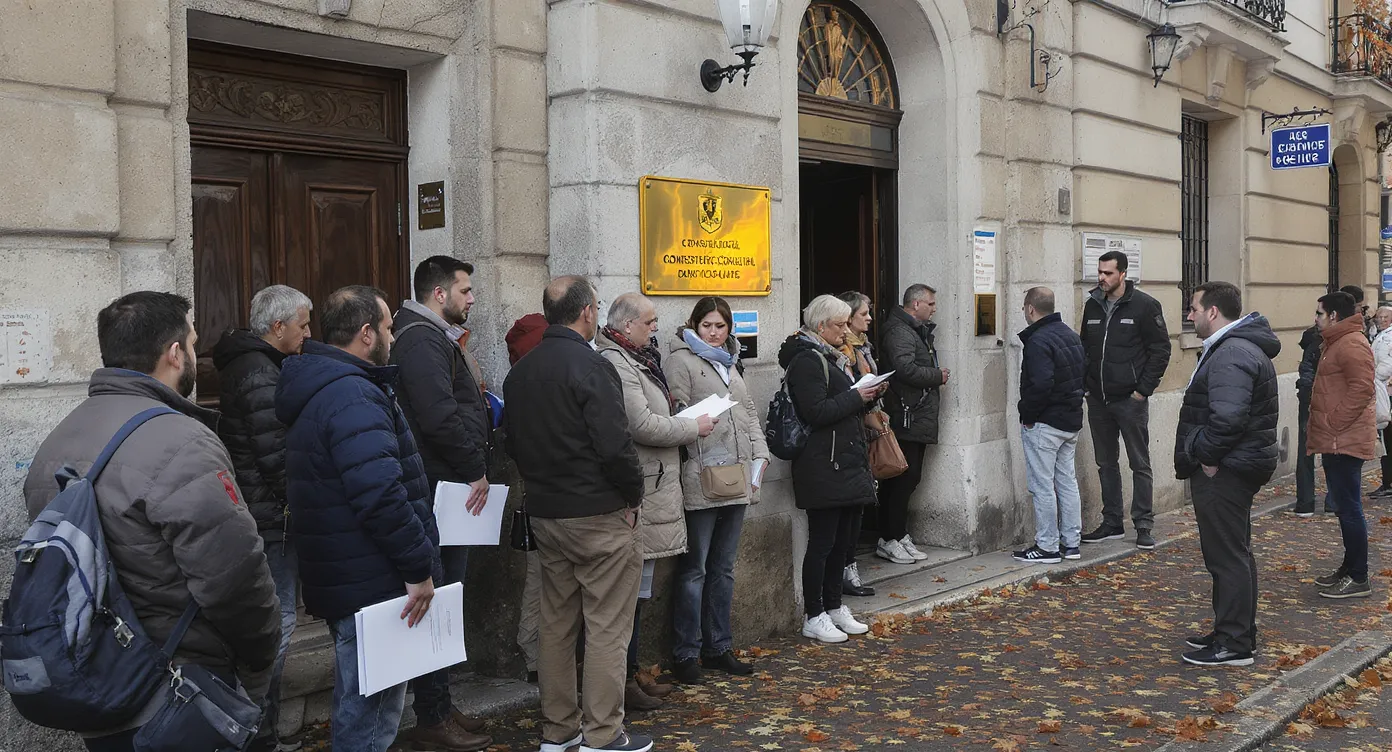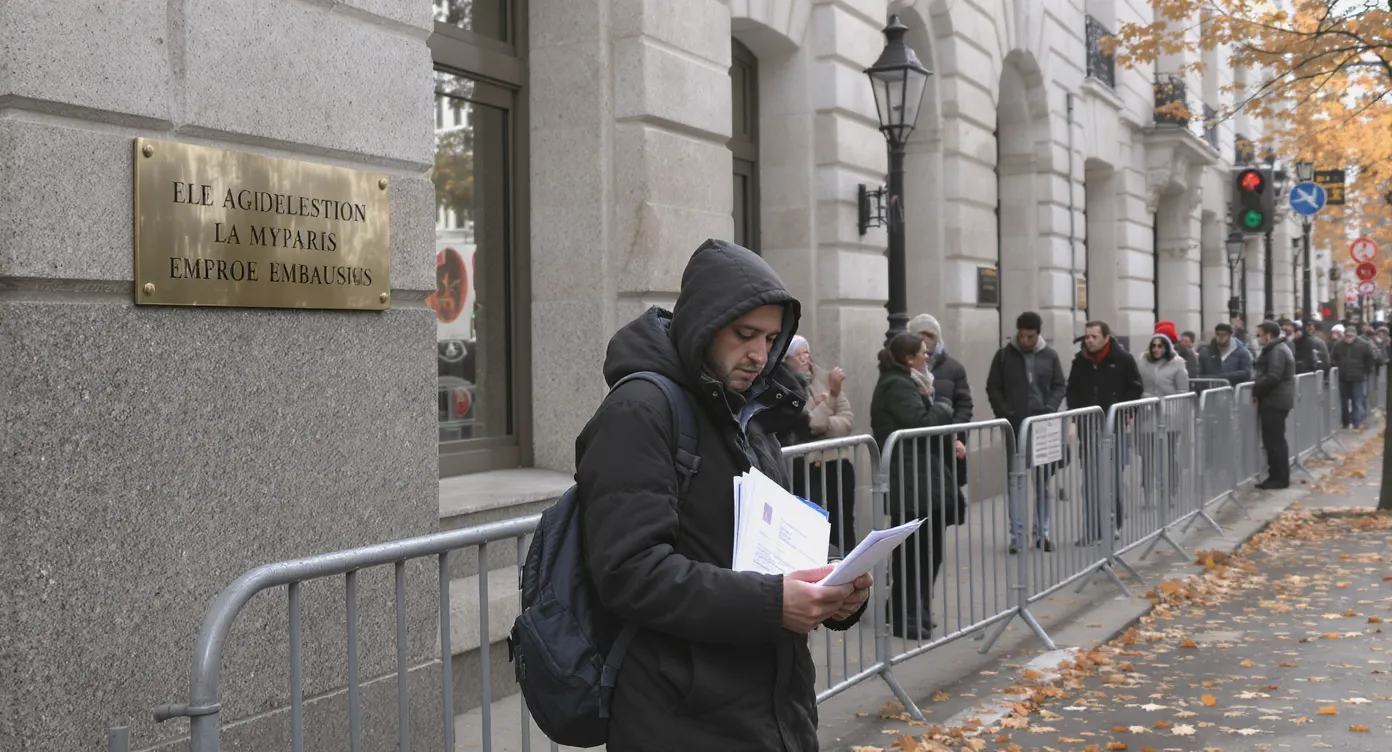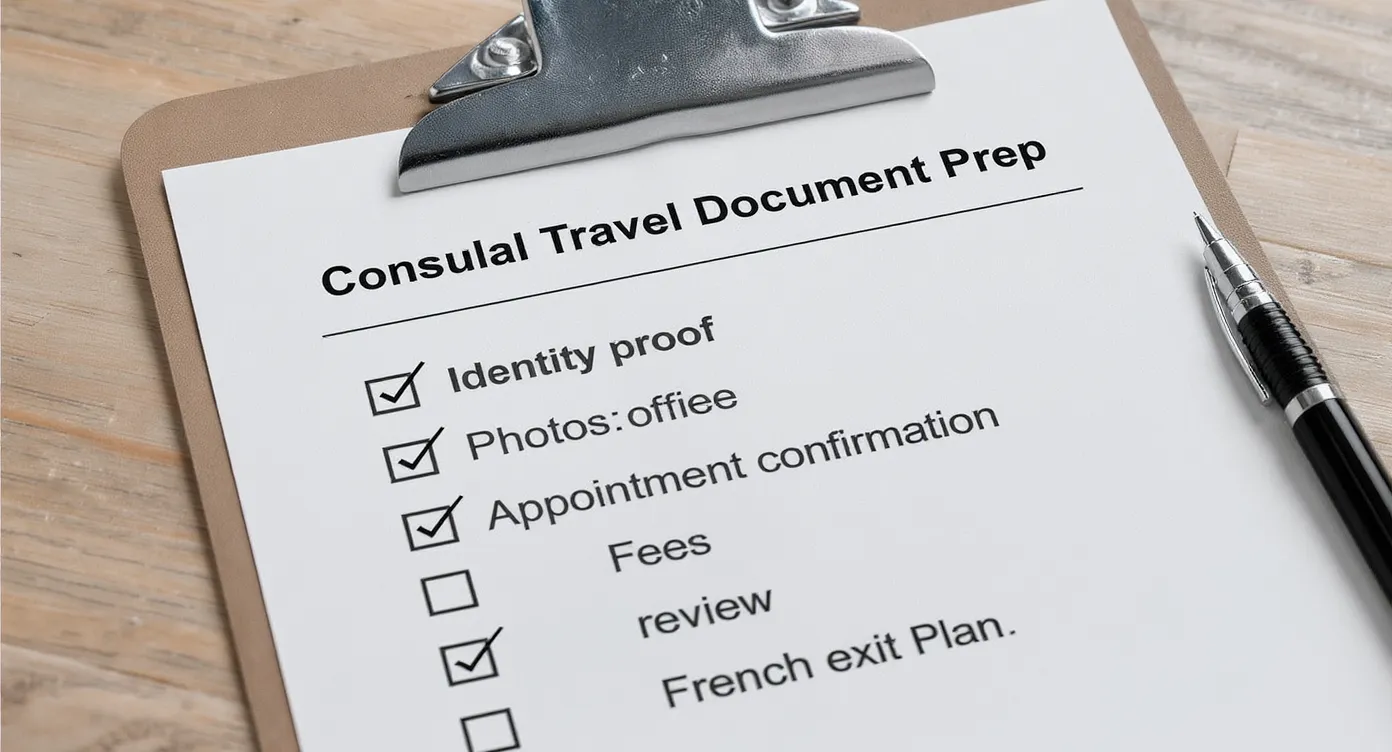Emergency Travel Documents for Undocumented Migrants: Consulate Options

If you are living in France without valid immigration papers and a family emergency abroad suddenly strikes, you may discover that boarding a plane is impossible without a travel document. Lost or expired passports, theft, or never having held one in the first place are common hurdles for undocumented migrants. Fortunately, most foreign consulates in France can issue an emergency travel document (sometimes called a laissez-passer or temporary passport) that lets you exit France legally and enter your home country. This guide explains the main consulate options, practical steps, legal risks, and how ImmiFrance can help you avoid unpleasant surprises.

1. When Do You Need an Emergency Travel Document?
Typical situations we see in 2025 include:
- Attending a critically ill parent’s funeral when your passport has expired or was never issued.
- Voluntary return after receiving an Obligation de Quitter le Territoire Français (OQTF) but before an enforcement flight is organised.
- Obtaining ID to legalise your status in France (certain prefectures ask for a valid passport before accepting a regularisation file).
- Late-notice business or humanitarian trips approved by an employer or NGO.
If you already hold a valid titre de séjour but your passport is lost or full, the prefecture may issue a French travel document for foreigners. Undocumented migrants, however, must normally rely on their own consulate or, in limited cases, on international organisations such as the International Organization for Migration (IOM) when arranging assisted voluntary return.
2. Main Consular Travel Documents Explained
| Document | Issued By | Validity | Purpose | Typical Fee (2025) |
|---|---|---|---|---|
| Emergency Passport / Travel Document | Home-country consulate in France | 6–12 months, single or multiple entry | One-way or short return trip | €25–€80 |
| Consular Laissez-Passer | Home-country consulate, some EU embassies | Single journey, usually 30 days | Direct repatriation or transit | Often free or <€30 |
| IOM Voluntary Return Laissez-Passer | IOM Paris office in coordination with embassy | Single journey to home country | Assisted voluntary return & reintegration | Free (funded programmes) |
| Stateless Travel Document (Titre de voyage) | French prefecture (rare, documented stateless only) | Up to 5 years | All travel | €45 tax stamp |
French authorities do not issue a travel document to undocumented foreigners simply for leisure trips abroad. The consulate of your nationality therefore remains the pivotal actor.
3. What to Expect at Your Consulate Appointment
Every embassy has its own forms, but most require:
- Proof of identity: photocopies of a previous passport, national ID card, birth certificate, or consular registration.
- French proof of address (utility bill, attestation d’hébergement) dated <3 months.
- Two to four biometric photos meeting ICAO standards.
- Police report if your passport was stolen ("récépissé de déclaration de vol").
- Fee in cash or card.
- A sworn statement explaining the urgency of travel and agreeing to return the document for cancellation if required.
Processing time varies from same-day (several African and Latin-American embassies) to 10–15 working days if the consulate must obtain central authorisation. During peak summer travel and major religious holidays, slots fill quickly—book as early as possible.
Booking Tips
- Most embassies now use online portals with mandatory account creation; double-check that the name order matches your civil documents.
- If appointments are fully booked, send a registered letter (LRAR) requesting an urgent slot and keep the postal proof—valuable if you later contest airline refusal or OQTF enforcement.
- Bring a French translator or friend if your French is limited; interpreters are rarely provided.
4. Will Visiting Your Consulate Endanger Your Status in France?
Many undocumented people fear arrest when approaching official buildings. In practice, French police do not patrol inside foreign embassies, which are considered inviolable premises under the Vienna Convention. Identity checks outside on the public pavement are possible but uncommon around consulates.
Still, weigh these three risk factors:
- Data sharing: Some consulates (notably from Maghreb and Sub-Saharan Africa) send a copy of the issued passport to French authorities only when the document is requested by police or a prefecture. Routine proactive sharing is rare.
- OQTF impact: Possessing travel papers may prompt the prefecture to schedule removal if you already have an enforceable OQTF. Review our guide on "OQTF vs. IRTF: key differences and defense strategies" before applying.
- Re-entry problems: Leaving France with a one-way laissez-passer usually bars re-entry without a visa, unless you hold another residence permit elsewhere in Schengen.
ImmiFrance can run a confidential risk assessment tailored to your prefecture, current procedures and family situation.
5. Step-by-Step Checklist (2025)
- Gather identity evidence even if expired.
- Scan everything and back-up to cloud or secure USB.
- Book online appointment; if none, send LRAR request.
- Take fresh biometric photos and print two copies of the consular form.
- Attend the consulate with originals, copies, fee, and translator if needed.
- Collect the document (same day or return visit) and inspect spelling.
- Buy travel ticket only after confirming validity period and entry rules.
- Prepare exit from France: If you have an OQTF, notify IOM or file flight details to avoid detention.
- Keep French proof of stay (tax declarations, pay slips) in case you plan future regularisation.
- Inform relatives in France and at destination of itinerary and document validity.

6. Special Scenarios
Minors Born in France
A child born in France to undocumented parents is not automatically French. For travel, the parents’ embassy normally issues a children’s laissez-passer. Some states require both parents’ consent; carry the second parent’s notarised authorisation.
Countries Without Embassy in France
If your country has no Paris mission (e.g., Eritrea recently closed its consulate), contact the accredited embassy in Brussels, Rome or London. Many travel documents are issued remotely after biometrics are captured at a mobile outreach in Paris once a quarter.
Conflict or Stateless Cases
- If your nationality is disputed or you are effectively stateless, register with the UNHCR statelessness unit. Proof of active procedure can prevent detention for lack of documents.
- Syrian nationals now receive a 12-month emergency passport via the Paris embassy on presentation of old civil extracts or a "family book".
7. Can You Return to France After Using an Emergency Passport?
Without a valid French visa or residence permit, re-entry is not guaranteed. Airlines may deny boarding, and French border police can issue a refusal of entry. If you hold a pending regularisation or asylum appeal, exiting France can void certain rights.
Options to safeguard a possible return:
- Visa de retour: very rarely granted to undocumented migrants.
- Re-entry with new long-stay visa: must be applied for from abroad via France-Visas; processing averages 45 days.
- ANEF receipt (récépissé): If you filed a renewal before departure, a valid récépissé + old resident card may allow re-entry (see our dedicated guide on "Residence permit renewal during overseas travel").
Always get personal legal advice before buying a return ticket.
8. Alternatives When the Consulate Refuses
Some embassies demand proof you will not claim asylum on arrival or insist on unpaid taxes at home. If refused:
- Ask for the refusal in writing: crucial for appeals.
- Contact the IOM Paris office for assisted voluntary return; they can negotiate directly with your embassy.
- Apply for a temporary laissez-passer from French authorities if expulsion is imminent (prefecture may request it under Article L333-1 CESEDA).
- Start or continue regularisation: review our step-by-step guide "From undocumented to documented through employment".
9. How ImmiFrance Can Help
- Remote document check before your consulate appointment.
- Risk audit on OQTF, IRTF and data-sharing based on your prefecture.
- Drafting of LRAR requests and formal reminders to embassies.
- Coordination with our lawyer network for emergency injunctions if police try to remove you without travel papers.
- Post-return strategy: visa planning, appeal preparation, or reintegration assistance.
Book a confidential 30-minute call and regain control of your travel options.
Frequently Asked Questions
Can I get an emergency passport if I have no identity proof at all? Consulates usually require at least one document or witness confirming your identity. Some accept a declaration from two community elders plus a birth affidavit.
Will French police arrest me when I pick up my laissez-passer? Arrests inside consulates are virtually unheard of. Outside, police may perform random checks, so carry any proof of address or pending procedures.
How long is an emergency passport valid? Typically 6–12 months, but some are single-use and expire the moment you reach your home country. Always read the validity page carefully.
Can I travel through another Schengen country with a consular laissez-passer? Not advised. Transit airports may refuse the document. Book a direct flight whenever possible.
Does getting a travel document ruin my future regularisation chances? Not automatically. Keep copies of everything and evidence of strong ties in France (work payslips, family life). A well-documented file can still succeed.
Ready to act but worried about making the wrong move? Schedule an expert consultation with ImmiFrance today. We will analyse your personal situation, contact your consulate if needed, and lay out a safe roadmap—whether that means travelling now or building a stronger regularisation case first.
